人教版初二英语Unit 2 I’ll help to clean up the city parks.Period 1课件+嵌入音频(102张ppt)
文档属性
| 名称 | 人教版初二英语Unit 2 I’ll help to clean up the city parks.Period 1课件+嵌入音频(102张ppt) |
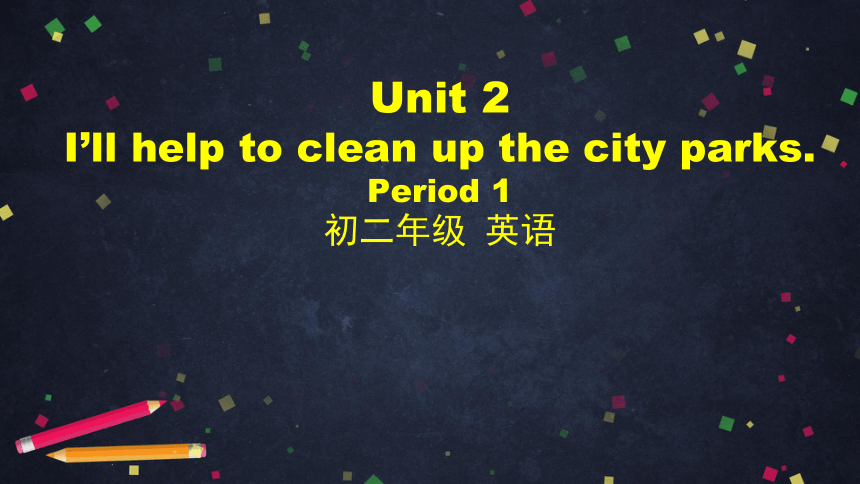
|
|
| 格式 | zip | ||
| 文件大小 | 50.3MB | ||
| 资源类型 | 教案 | ||
| 版本资源 | 人教新目标(Go for it)版 | ||
| 科目 | 英语 | ||
| 更新时间 | 2020-05-02 00:00:00 | ||
图片预览

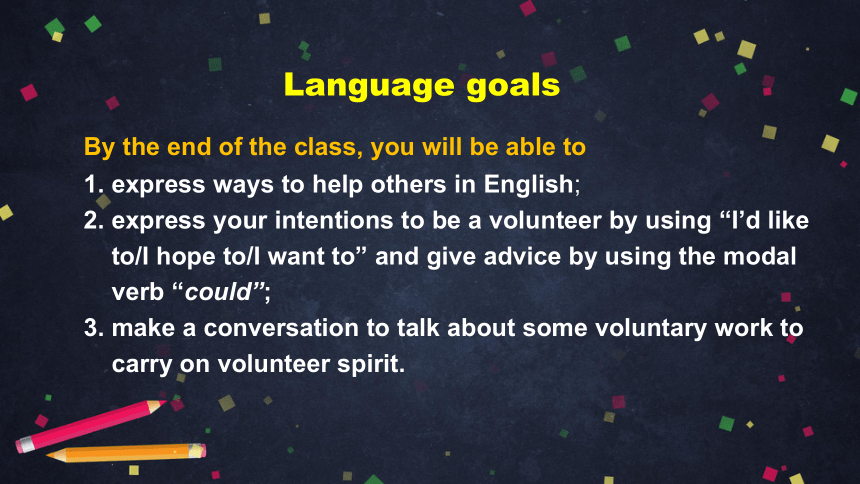
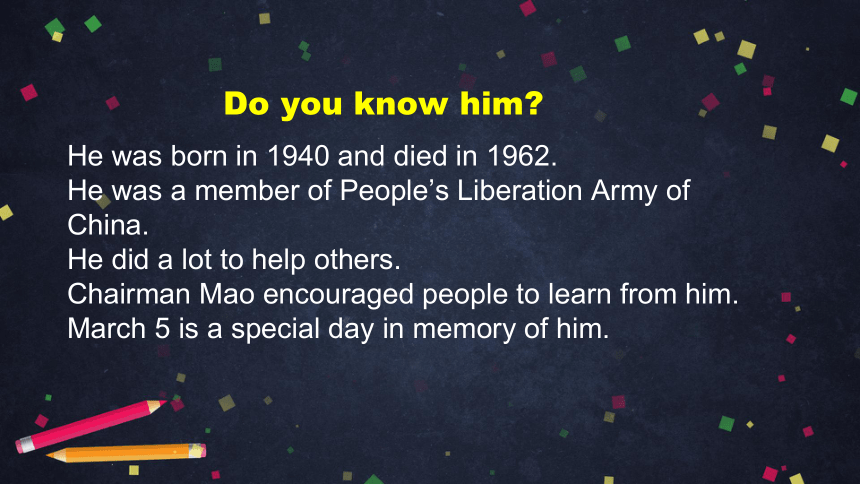
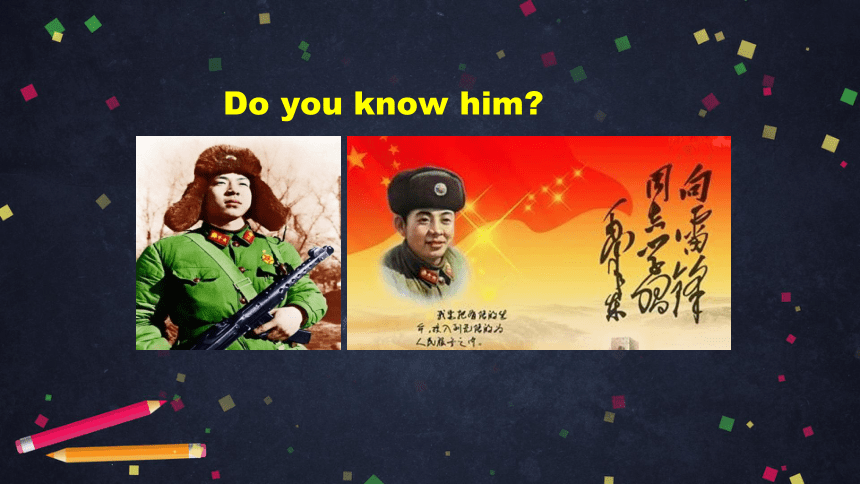
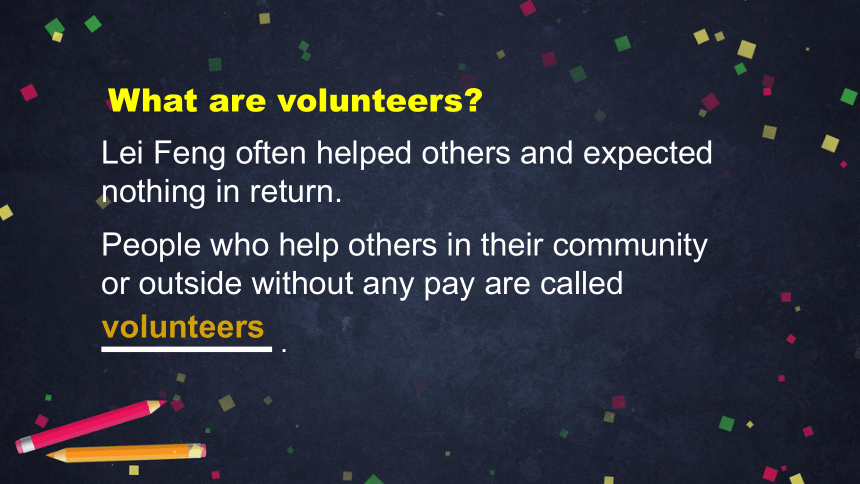
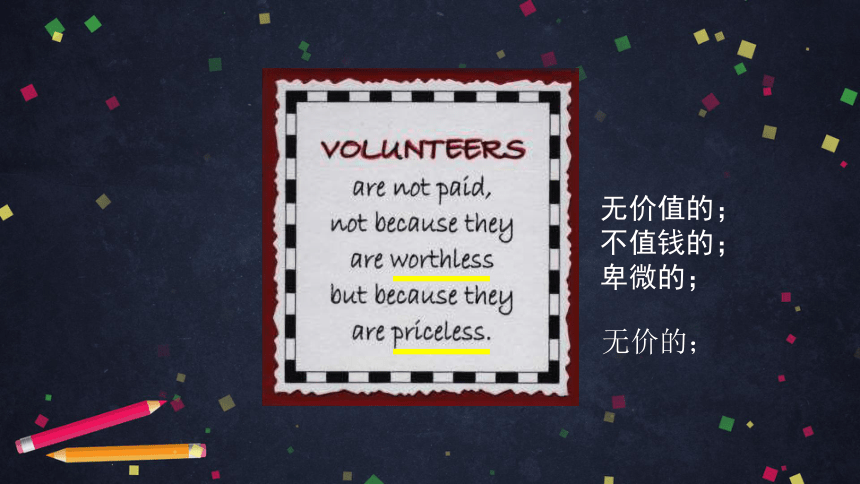
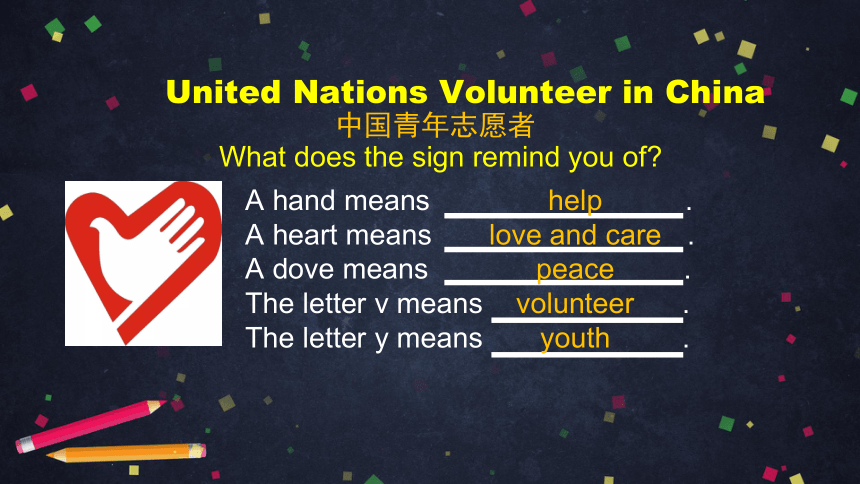

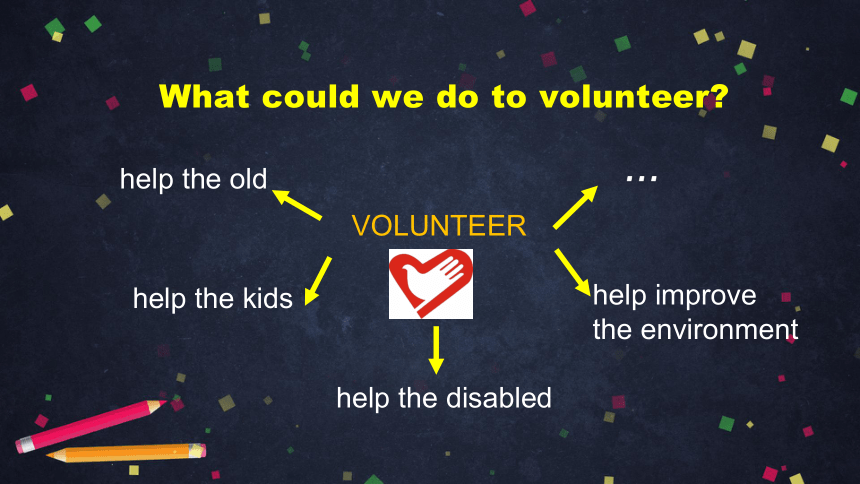
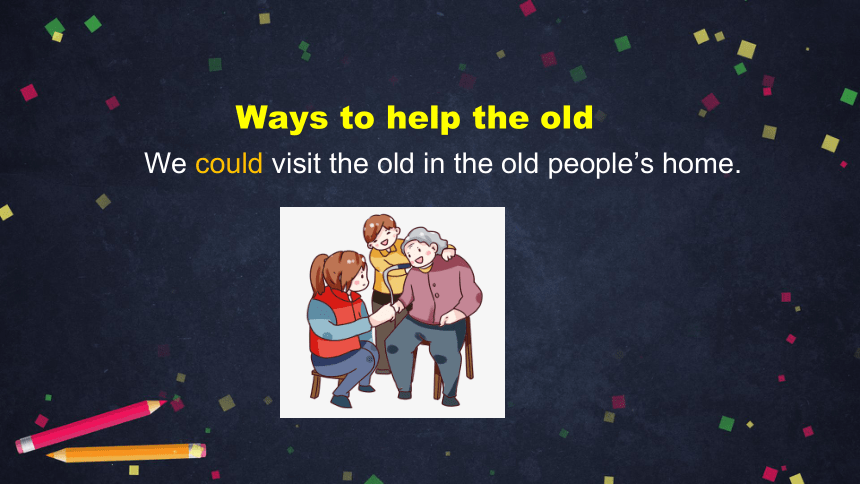
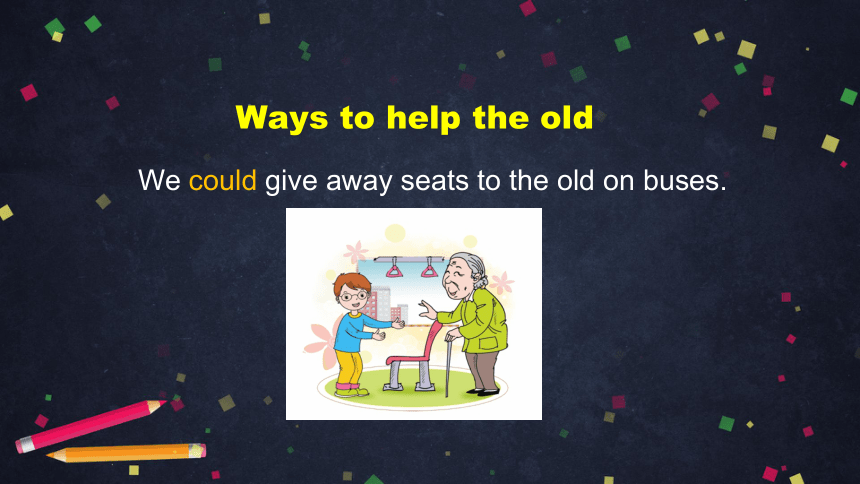
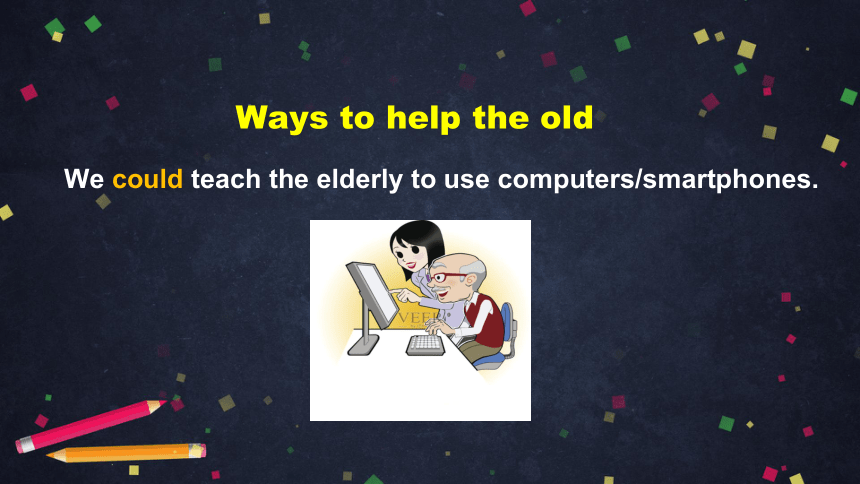
文档简介
(共102张PPT)
Unit 2
I’ll help to clean up the city parks.
Period 1
初二年级 英语
Language goals
By the end of the class, you will be able to
1. express ways to help others in English;
2. express your intentions to be a volunteer by using “I’d like
to/I hope to/I want to” and give advice by using the modal
verb “could”;
3. make a conversation to talk about some voluntary work to
carry on volunteer spirit.
He was born in 1940 and died in 1962.
He was a member of People’s Liberation Army of China.
He did a lot to help others.
Chairman Mao encouraged people to learn from him.
March 5 is a special day in memory of him.
Do you know him?
Do you know him?
People who help others in their community
or outside without any pay are called
.
volunteers
Lei Feng often helped others and expected nothing in return.
What are volunteers?
无价值的;
不值钱的;
卑微的;
无价的;
A hand means .
A heart means .
A dove means .
The letter v means .
The letter y means .
help
love and care
peace
volunteer
youth
What does the sign remind you of?
United Nations Volunteer in China
中国青年志愿者
The benefits of volunteering
There are many people around us, in our country or even in the world who need different kinds of help. So voluntary work is important and great. Not only can it make people live better but also it can bring happiness to volunteers.
…
What could we do to volunteer?
volunteer
help the kids
help the old
help the disabled
help improve
the environment
We could visit the old in the old people’s home.
Ways to help the old
We could give away seats to the old on buses.
Ways to help the old
We could teach the elderly to use computers/smartphones.
Ways to help the old
We could teach kids in the mountainous areas.
Ways to help kids
We could give away used books to kids.
Ways to help kids
We could donate money to the Hope Project.
Ways to help kids
We could help the disabled people cross the street.
Ways to help the disabled
We could plant more trees.
Ways to improve the environment
We could put up signs about protecting the environment.
Ways to improve the environment
We could help pick up the trash.
Ways to improve the environment
We could clean up the community.
Ways to improve the environment
We could visit the old in the old people’s home.
Check the expressions.
We could give away seats to the old on buses.
Check the expressions.
We could teach the elderly to use computers/smartphones.
Check the expressions.
We could teach kids in the mountainous areas.
Check the expressions.
We could give away used books to kids.
Check the expressions.
We could donate money to the Hope Project.
Check the expressions.
We could help the disabled people cross the street.
Check the expressions.
We could plant more trees.
Check the expressions.
We could put up signs about protecting the environment.
Check the expressions.
We could help pick up the trash.
Check the expressions.
We could clean up the community.
Check the expressions.
1a. Look and say.
Look and say.
We could visit sick children in the hospital
and cheer them up.
We could give out food at the food bank to stop hunger.
Look and say.
give money to the poor
clean chewing gum on the ground
raise money to charity
…
1a. List other ways you could help people.
I hope to
I’d like to
I’m willing to
I expect to
I have a strong desire to
The girl could visit the sick kids in the hospital
to cheer them up.
The boy could give out food at the food bank.
The girl could volunteer in an after-school study
program to teach kids.
The boy could help to clean up the city parks.
1b. Listen and number.
The girl could visit the sick kids in the hospital
to cheer them up.
The boy could give out food at the food bank.
The girl could volunteer in an after-school study
program to teach kids.
The boy could help to clean up the city parks.
3
2
4
1
1b. Listen and number.
1. I hope to work outside. You could help to
the city parks.
2. I’d like to help homeless
people. You could food at the food bank to help feed them.
1b. Listen and get information. (见任务单)
What to do How to do it
3. I want to cheer up sick
kids. You could
in the hospital.
4. I’d like to help kids with
their schoolwork. You could in an after-school study program to teach kids.
What to do How to do it
1b. Listen and get information. (见任务单)
1. I hope to work outside. You could help to
the city parks.
2. I’d like to help homeless
people. You could food at the food bank to help feed them.
1b. Listen and get information. (见任务单)
What to do How to do it
3. I want to cheer up sick
kids. You could
in the hospital.
4. I’d like to help kids with
their schoolwork. You could in an after-school study program to teach kids.
What to do How to do it
1b. Listen and get information. (见任务单)
1. I hope to work outside. You could help to
the city parks.
2. I’d like to help homeless
people. You could food at the food bank to help feed them.
clean up
What to do How to do it
give out
1b. Listen and get information. (见任务单)
What to do How to do it
3. I want to cheer up sick
kids. You could
in the hospital.
4. I’d like to help kids with
their schoolwork. You could in an after-school study program to teach kids.
visit the sick
kids
volunteer
1b. Listen and get information. (见任务单)
What to do How to do it
work outside
clean up the city parks
help homeless people
give out food and help feed homeless people
cheer up sick kids
visit sick kids in the hospital
help kids with their
schoolwork
volunteer in an after-
school study program
1b. Read the conversations.
What to do How to do it
work outside
clean up the city parks
help homeless people
give out food and help feed homeless people
cheer up sick kids
visit sick kids in the hospital
help kids with their
schoolwork
volunteer in an after-school
study program
1b. Make conversations according to the chart.
1b. Make conversations according to the
chart.
A: I’d like to work outside.
B: You could help to clean up the city parks.
1b. Make conversations according to the
chart.
A: I’d like to help homeless people.
B: You could give out food and help feed homeless
people.
1b. Make conversations according to the
chart.
A: I’d like to cheer up sick kids.
B: You could visit sick kids in the hospital.
1b. Make conversations according to the
chart.
A: I’d like to help kids with their schoolwork.
B: You could volunteer in an after-school study
program.
1b. Retell the conversations according to
the chart.
Sample:
The girl/The boy in conversation one/two/three/four would like to/ wants to/hopes to ...
and her/his friend thinks/advises that he/she could...
Conversation one
The boy in conversation two hopes to work outside and his friend advises that he could help to clean up the city.
work outside
clean up the city parks
What to do How to do it
Conversation two
The boy in conversation two would like to help homeless people and his friend thinks that he could give out food at the food bank to help feed them.
What to do How to do it
help homeless people
give out food and help feed homeless people
Conversation three
The girl in conversation three would like to cheer up sick kids and her friend thinks that she could ask hospitals to let her visit the sick kids.
What to do How to do it
cheer up sick kids
visit sick kids in the hospital
Conversation four
The girl in conversation four would like to help kids with their schoolwork and her friend thinks that she could volunteer in an after-school study program
.
What to do How to do it
help kids with their
schoolwork
volunteer in an after-school
study program
2a. Look and say.
Phrases
put an ad on TV
Phrases
put up signs
Phrases
call up students
Phrases
put an ad in the newspaper
Phrases
hand out notices
put an ad on TV
put up signs
call up students
put an ad in the newspaper
hand out notices
√
√
√
2a. Listen and check(√).
1. We need to a plan to tell people about the city park clean-up.
2. Clean-Up Day is only two weeks from now. We can’t
making a plan.
3. We could signs.
2b. Listen and get information.
4. Let’s make some notices, too. Then I ’ll them
after school.
5. We could each 10 students and ask them to
come.
2b. Listen and get information.
1. We need to a plan to tell people about the city park clean-up.
2. Clean-Up Day is only two weeks from now. We can’t
making a plan.
3. We could signs.
2b. Listen and get information.
4. Let’s make some notices, too. Then I ’ll them
after school.
5. We could each 10 students and ask them to
come.
2b. Listen and get information.
1. We need to a plan to tell people about the city park clean-up.
2. Clean-Up Day is only two weeks from now. We can’t
making a plan.
3. We could signs.
come up with
put
put up
off
2b. Listen and get information.
4. Let’s make some notices, too. Then I ’ll them
after school.
5. We could each 10 students and ask them to come.
hand out
call up
2b. Listen and get information.
The old people’s home
What can we do at an old people’s home?
read the newspaper to the old people
talk to/with them
let them tell their stories about the past and how things used to be
listen to them
care for them
help them clean their rooms
write to their friends or family for them
…
What can we do at an old people’s home?
read the newspaper to the old people
talk to/with them
let them tell their stories about the past and how things used to be
listen to them
care for them
help them clean their rooms
write to their friends or family for them
…
1. Helen is making some plans to work in an
this summer.
2. Tom did that last summer! He helped out with
things like the newspaper to the old people,
or just to them. They him stories about
the past and how things used to be.
2d. Listen and get information. (见任务单)
3. Tom thought they should them and
them.
2d. Listen and get information. (见任务单)
1. Helen is making some plans to work in an
this summer.
2. Tom did that last summer! He helped out with
things like the newspaper to the old people,
or just to them. They him stories about
the past and how things used to be.
2d. Listen and get information. (见任务单)
3. Tom thought they should them and
them.
2d. Listen and get information. (见任务单)
1. Helen is making some plans to work in an
this summer.
2. Tom did that last summer! He helped out with
things like the newspaper to the old people,
or just to them. They him stories about
the past and how things used to be.
old people’s home
talking
told
2d. Listen and get information. (见任务单)
reading
3. Tom thought they should them and
them.
listen to
care for
2d. Listen and get information. (见任务单)
2d.Read and answer the questions.
1. What is Helen going to do this summer?
2. When did Tom volunteer ?
3. What did he do to help others?
4. What is Tom’s advice?
(见任务单)
1. What is Helen going to do this summer?
2. When did Tom volunteer ?
She is going to work in an old people’s home this
summer.
Last summer.
2d.Read and answer the questions.
(见任务单)
3. What did he do to help others?
4. What is Tom’s advice?
He read the newspaper to the old people , talked to them and listened to their stories about the past and how things used to be.
They should listen to the old people and care for them.
2d.Read and answer the questions.
(见任务单)
.
Helen: Hi, Tom. I’m making some plans to work in an old
people’s home this summer.
Tom: Really? I did that last summer!
Helen: Oh, what did they ask you to help out with?
Tom: Mm ... things like reading the newspaper to the old
people, or just talking to them. They told me stories
about the past and how things used to be.
2d. Read the conversation.
Helen: That sounds interesting.
Tom: Yeah, a lot of old people are lonely. We should
listen to them and care for them.
Helen: You’re right. I mean, we’re all going to be old one
day, too.
2d. Read the conversation.
What are the benefits of volunteer work?
We could make our society more beautiful.
We could light the other people’s lives.
We could make our lives full of love.
Benefits to others
build up confidence/ friendship.
get a sense of satisfaction/achievement.
increase new skills.
be more independent/ patient/ outgoing.
…
By volunteering,
We could
Benefits to ourselves
There are many people around us, in our country or even in the world who need different kinds of help. So voluntary work is an important and great cause. Not only can it make people live better but also it can bring happiness to volunteers.
Benefits of volunteering
So we should form the sense of helping others and take an active part in voluntary activities from now on and try to make the world more beautiful and harmonious.
Benefits of volunteering
The School Volunteer Day is coming, what would you like to do?
Volunteer plan
A: We need to come up with a plan for …
B: Let’s have lunch first.
…
A: Err, we could ...
2c. Make a conversation about what you
are going to do to volunteer.
A:We need to come up with a plan for the School
Volunteer Day.
B: Let’s have lunch first.
A: I don’t think so. The activity is only two weeks from now.
We need to start now.
B: You’re right. We could go to the old people’s home.
The old people there need our help.
Sample
A: Yes, it’s possible for them to feel lonely. And they
may not have enough books to read.
B: Besides, they don’t have much computer knowledge.
A: We can do a lot, for example, we can chat with them
to make them feel less lonely.
B: We can donate books to them, too.
Sample
A: I’m good at using computers. I can teach them how to
use them with more love and care.
B:Let’s help the elderly live a better life.
Sample
A:We need to come up with a plan for the School
Volunteer Day.
B: Let’s have lunch first.
A: I don’t think so. The activity is only two weeks from now.
We need to start now.
B: You’re right. We could go to the old people’s home.
The old people there need our help.
Sample
A: Yes, it’s possible for them to feel lonely. And they
may not have enough books to read.
B: Besides, they don’t have much computer knowledge.
A: We can do a lot, for example, we can chat with them
to make them feel less lonely.
B: We can donate books to them, too.
Sample
A: I’m good at using computers. I can teach them how to
use them with more love and care.
B:Let’s help the elderly live a better life.
Sample
A:We need to come up with a plan for the School
Volunteer Day.
B: Let’s have lunch first.
A: I don’t think so. The activity is only two weeks from now.
We need to start now.
B: You’re right. We could go to the old people’s home.
The old people there need our help.
Sample
A: Yes, it’s possible for them to feel lonely. And they
may not have enough books to read.
B: Besides, they don’t have much computer knowledge.
A: We can do a lot, for example, we can chat with them
to make them feel less lonely.
B: We can donate books to them, too.
Sample
A: I’m good at using computers. I can teach them how to
use them with more love and care.
B:Let’s help the elderly live a better life.
Sample
…
What could we do to volunteer?
volunteer
help the kids
help the old
help the disabled
help improve
the environment
give money to the poor
offer my seat to others on the bus
give our old books to “Hope School”
help the blind cross the road
clean chewing gum on the ground
raise money to charity
…
We could
Ways we could help people
It’s better giving than receiving.
The rose’s in her hand,the flavor in mine.
1.跟读课后单词并记忆;
2.跟录音朗读课文听力原稿;
3.做本节课配套主题阅读练习。
Homework
Thanks for watching.
Unit 2
I’ll help to clean up the city parks.
Period 1
初二年级 英语
Language goals
By the end of the class, you will be able to
1. express ways to help others in English;
2. express your intentions to be a volunteer by using “I’d like
to/I hope to/I want to” and give advice by using the modal
verb “could”;
3. make a conversation to talk about some voluntary work to
carry on volunteer spirit.
He was born in 1940 and died in 1962.
He was a member of People’s Liberation Army of China.
He did a lot to help others.
Chairman Mao encouraged people to learn from him.
March 5 is a special day in memory of him.
Do you know him?
Do you know him?
People who help others in their community
or outside without any pay are called
.
volunteers
Lei Feng often helped others and expected nothing in return.
What are volunteers?
无价值的;
不值钱的;
卑微的;
无价的;
A hand means .
A heart means .
A dove means .
The letter v means .
The letter y means .
help
love and care
peace
volunteer
youth
What does the sign remind you of?
United Nations Volunteer in China
中国青年志愿者
The benefits of volunteering
There are many people around us, in our country or even in the world who need different kinds of help. So voluntary work is important and great. Not only can it make people live better but also it can bring happiness to volunteers.
…
What could we do to volunteer?
volunteer
help the kids
help the old
help the disabled
help improve
the environment
We could visit the old in the old people’s home.
Ways to help the old
We could give away seats to the old on buses.
Ways to help the old
We could teach the elderly to use computers/smartphones.
Ways to help the old
We could teach kids in the mountainous areas.
Ways to help kids
We could give away used books to kids.
Ways to help kids
We could donate money to the Hope Project.
Ways to help kids
We could help the disabled people cross the street.
Ways to help the disabled
We could plant more trees.
Ways to improve the environment
We could put up signs about protecting the environment.
Ways to improve the environment
We could help pick up the trash.
Ways to improve the environment
We could clean up the community.
Ways to improve the environment
We could visit the old in the old people’s home.
Check the expressions.
We could give away seats to the old on buses.
Check the expressions.
We could teach the elderly to use computers/smartphones.
Check the expressions.
We could teach kids in the mountainous areas.
Check the expressions.
We could give away used books to kids.
Check the expressions.
We could donate money to the Hope Project.
Check the expressions.
We could help the disabled people cross the street.
Check the expressions.
We could plant more trees.
Check the expressions.
We could put up signs about protecting the environment.
Check the expressions.
We could help pick up the trash.
Check the expressions.
We could clean up the community.
Check the expressions.
1a. Look and say.
Look and say.
We could visit sick children in the hospital
and cheer them up.
We could give out food at the food bank to stop hunger.
Look and say.
give money to the poor
clean chewing gum on the ground
raise money to charity
…
1a. List other ways you could help people.
I hope to
I’d like to
I’m willing to
I expect to
I have a strong desire to
The girl could visit the sick kids in the hospital
to cheer them up.
The boy could give out food at the food bank.
The girl could volunteer in an after-school study
program to teach kids.
The boy could help to clean up the city parks.
1b. Listen and number.
The girl could visit the sick kids in the hospital
to cheer them up.
The boy could give out food at the food bank.
The girl could volunteer in an after-school study
program to teach kids.
The boy could help to clean up the city parks.
3
2
4
1
1b. Listen and number.
1. I hope to work outside. You could help to
the city parks.
2. I’d like to help homeless
people. You could food at the food bank to help feed them.
1b. Listen and get information. (见任务单)
What to do How to do it
3. I want to cheer up sick
kids. You could
in the hospital.
4. I’d like to help kids with
their schoolwork. You could in an after-school study program to teach kids.
What to do How to do it
1b. Listen and get information. (见任务单)
1. I hope to work outside. You could help to
the city parks.
2. I’d like to help homeless
people. You could food at the food bank to help feed them.
1b. Listen and get information. (见任务单)
What to do How to do it
3. I want to cheer up sick
kids. You could
in the hospital.
4. I’d like to help kids with
their schoolwork. You could in an after-school study program to teach kids.
What to do How to do it
1b. Listen and get information. (见任务单)
1. I hope to work outside. You could help to
the city parks.
2. I’d like to help homeless
people. You could food at the food bank to help feed them.
clean up
What to do How to do it
give out
1b. Listen and get information. (见任务单)
What to do How to do it
3. I want to cheer up sick
kids. You could
in the hospital.
4. I’d like to help kids with
their schoolwork. You could in an after-school study program to teach kids.
visit the sick
kids
volunteer
1b. Listen and get information. (见任务单)
What to do How to do it
work outside
clean up the city parks
help homeless people
give out food and help feed homeless people
cheer up sick kids
visit sick kids in the hospital
help kids with their
schoolwork
volunteer in an after-
school study program
1b. Read the conversations.
What to do How to do it
work outside
clean up the city parks
help homeless people
give out food and help feed homeless people
cheer up sick kids
visit sick kids in the hospital
help kids with their
schoolwork
volunteer in an after-school
study program
1b. Make conversations according to the chart.
1b. Make conversations according to the
chart.
A: I’d like to work outside.
B: You could help to clean up the city parks.
1b. Make conversations according to the
chart.
A: I’d like to help homeless people.
B: You could give out food and help feed homeless
people.
1b. Make conversations according to the
chart.
A: I’d like to cheer up sick kids.
B: You could visit sick kids in the hospital.
1b. Make conversations according to the
chart.
A: I’d like to help kids with their schoolwork.
B: You could volunteer in an after-school study
program.
1b. Retell the conversations according to
the chart.
Sample:
The girl/The boy in conversation one/two/three/four would like to/ wants to/hopes to ...
and her/his friend thinks/advises that he/she could...
Conversation one
The boy in conversation two hopes to work outside and his friend advises that he could help to clean up the city.
work outside
clean up the city parks
What to do How to do it
Conversation two
The boy in conversation two would like to help homeless people and his friend thinks that he could give out food at the food bank to help feed them.
What to do How to do it
help homeless people
give out food and help feed homeless people
Conversation three
The girl in conversation three would like to cheer up sick kids and her friend thinks that she could ask hospitals to let her visit the sick kids.
What to do How to do it
cheer up sick kids
visit sick kids in the hospital
Conversation four
The girl in conversation four would like to help kids with their schoolwork and her friend thinks that she could volunteer in an after-school study program
.
What to do How to do it
help kids with their
schoolwork
volunteer in an after-school
study program
2a. Look and say.
Phrases
put an ad on TV
Phrases
put up signs
Phrases
call up students
Phrases
put an ad in the newspaper
Phrases
hand out notices
put an ad on TV
put up signs
call up students
put an ad in the newspaper
hand out notices
√
√
√
2a. Listen and check(√).
1. We need to a plan to tell people about the city park clean-up.
2. Clean-Up Day is only two weeks from now. We can’t
making a plan.
3. We could signs.
2b. Listen and get information.
4. Let’s make some notices, too. Then I ’ll them
after school.
5. We could each 10 students and ask them to
come.
2b. Listen and get information.
1. We need to a plan to tell people about the city park clean-up.
2. Clean-Up Day is only two weeks from now. We can’t
making a plan.
3. We could signs.
2b. Listen and get information.
4. Let’s make some notices, too. Then I ’ll them
after school.
5. We could each 10 students and ask them to
come.
2b. Listen and get information.
1. We need to a plan to tell people about the city park clean-up.
2. Clean-Up Day is only two weeks from now. We can’t
making a plan.
3. We could signs.
come up with
put
put up
off
2b. Listen and get information.
4. Let’s make some notices, too. Then I ’ll them
after school.
5. We could each 10 students and ask them to come.
hand out
call up
2b. Listen and get information.
The old people’s home
What can we do at an old people’s home?
read the newspaper to the old people
talk to/with them
let them tell their stories about the past and how things used to be
listen to them
care for them
help them clean their rooms
write to their friends or family for them
…
What can we do at an old people’s home?
read the newspaper to the old people
talk to/with them
let them tell their stories about the past and how things used to be
listen to them
care for them
help them clean their rooms
write to their friends or family for them
…
1. Helen is making some plans to work in an
this summer.
2. Tom did that last summer! He helped out with
things like the newspaper to the old people,
or just to them. They him stories about
the past and how things used to be.
2d. Listen and get information. (见任务单)
3. Tom thought they should them and
them.
2d. Listen and get information. (见任务单)
1. Helen is making some plans to work in an
this summer.
2. Tom did that last summer! He helped out with
things like the newspaper to the old people,
or just to them. They him stories about
the past and how things used to be.
2d. Listen and get information. (见任务单)
3. Tom thought they should them and
them.
2d. Listen and get information. (见任务单)
1. Helen is making some plans to work in an
this summer.
2. Tom did that last summer! He helped out with
things like the newspaper to the old people,
or just to them. They him stories about
the past and how things used to be.
old people’s home
talking
told
2d. Listen and get information. (见任务单)
reading
3. Tom thought they should them and
them.
listen to
care for
2d. Listen and get information. (见任务单)
2d.Read and answer the questions.
1. What is Helen going to do this summer?
2. When did Tom volunteer ?
3. What did he do to help others?
4. What is Tom’s advice?
(见任务单)
1. What is Helen going to do this summer?
2. When did Tom volunteer ?
She is going to work in an old people’s home this
summer.
Last summer.
2d.Read and answer the questions.
(见任务单)
3. What did he do to help others?
4. What is Tom’s advice?
He read the newspaper to the old people , talked to them and listened to their stories about the past and how things used to be.
They should listen to the old people and care for them.
2d.Read and answer the questions.
(见任务单)
.
Helen: Hi, Tom. I’m making some plans to work in an old
people’s home this summer.
Tom: Really? I did that last summer!
Helen: Oh, what did they ask you to help out with?
Tom: Mm ... things like reading the newspaper to the old
people, or just talking to them. They told me stories
about the past and how things used to be.
2d. Read the conversation.
Helen: That sounds interesting.
Tom: Yeah, a lot of old people are lonely. We should
listen to them and care for them.
Helen: You’re right. I mean, we’re all going to be old one
day, too.
2d. Read the conversation.
What are the benefits of volunteer work?
We could make our society more beautiful.
We could light the other people’s lives.
We could make our lives full of love.
Benefits to others
build up confidence/ friendship.
get a sense of satisfaction/achievement.
increase new skills.
be more independent/ patient/ outgoing.
…
By volunteering,
We could
Benefits to ourselves
There are many people around us, in our country or even in the world who need different kinds of help. So voluntary work is an important and great cause. Not only can it make people live better but also it can bring happiness to volunteers.
Benefits of volunteering
So we should form the sense of helping others and take an active part in voluntary activities from now on and try to make the world more beautiful and harmonious.
Benefits of volunteering
The School Volunteer Day is coming, what would you like to do?
Volunteer plan
A: We need to come up with a plan for …
B: Let’s have lunch first.
…
A: Err, we could ...
2c. Make a conversation about what you
are going to do to volunteer.
A:We need to come up with a plan for the School
Volunteer Day.
B: Let’s have lunch first.
A: I don’t think so. The activity is only two weeks from now.
We need to start now.
B: You’re right. We could go to the old people’s home.
The old people there need our help.
Sample
A: Yes, it’s possible for them to feel lonely. And they
may not have enough books to read.
B: Besides, they don’t have much computer knowledge.
A: We can do a lot, for example, we can chat with them
to make them feel less lonely.
B: We can donate books to them, too.
Sample
A: I’m good at using computers. I can teach them how to
use them with more love and care.
B:Let’s help the elderly live a better life.
Sample
A:We need to come up with a plan for the School
Volunteer Day.
B: Let’s have lunch first.
A: I don’t think so. The activity is only two weeks from now.
We need to start now.
B: You’re right. We could go to the old people’s home.
The old people there need our help.
Sample
A: Yes, it’s possible for them to feel lonely. And they
may not have enough books to read.
B: Besides, they don’t have much computer knowledge.
A: We can do a lot, for example, we can chat with them
to make them feel less lonely.
B: We can donate books to them, too.
Sample
A: I’m good at using computers. I can teach them how to
use them with more love and care.
B:Let’s help the elderly live a better life.
Sample
A:We need to come up with a plan for the School
Volunteer Day.
B: Let’s have lunch first.
A: I don’t think so. The activity is only two weeks from now.
We need to start now.
B: You’re right. We could go to the old people’s home.
The old people there need our help.
Sample
A: Yes, it’s possible for them to feel lonely. And they
may not have enough books to read.
B: Besides, they don’t have much computer knowledge.
A: We can do a lot, for example, we can chat with them
to make them feel less lonely.
B: We can donate books to them, too.
Sample
A: I’m good at using computers. I can teach them how to
use them with more love and care.
B:Let’s help the elderly live a better life.
Sample
…
What could we do to volunteer?
volunteer
help the kids
help the old
help the disabled
help improve
the environment
give money to the poor
offer my seat to others on the bus
give our old books to “Hope School”
help the blind cross the road
clean chewing gum on the ground
raise money to charity
…
We could
Ways we could help people
It’s better giving than receiving.
The rose’s in her hand,the flavor in mine.
1.跟读课后单词并记忆;
2.跟录音朗读课文听力原稿;
3.做本节课配套主题阅读练习。
Homework
Thanks for watching.
同课章节目录
- Unit 1 What's the matter?
- Section A
- Section B
- Unit 2 I'll help to clean up the city parks.
- Section A
- Section B
- Unit 3 Could you please clean your room?
- Section A
- Section B
- Unit 4 Why don't you talk to your parents?
- Section A
- Section B
- Unit 5 What were you doing when the rainstorm came
- Section A
- Section B
- Review of Units 1-5
- Unit 6 An old man tried to move the mountains.
- Section A
- Section B
- Unit 7 What's the highest mountain in the world?
- Section A
- Section B
- Unit 8 Have you read Treasure Island yet?
- Section A
- Section B
- Unit 9 Have you ever been to a museum?
- Section A
- Section B
- Unit 10 I've had this bike for three years.
- Section A
- Section B
